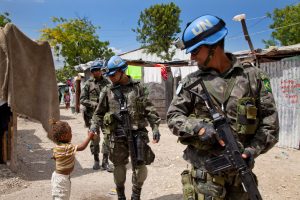UN winds up its Haiti mission with a pitiful epitaph: It brought cholera to the island

On Friday (Oct 6) the UN wound up MINUSTAH, its 13-year-old peacekeeping mission in Haiti, having changed it forever but necessarily in the way intended. The last 100 UN troops leave soon and the mission officially ends on October 15.
So, what did it accomplish?
The unkindest but truest epitaph for MINUSTAH is that it brought disease to a country that remained unaffected by the three great cholera epidemics that raged in the Caribbean in the nineteenth century. Thousands died and Haiti’s natural water bodies were infected.
But it is also true that MINUSTAH maintained order (of a sort) in politically turbulent Haiti. Now, the UN will be engaged in police and judicial training, sending 1,300 international civilian police officers and 350 civilians to Haiti.
What this will accomplish depends on who you ask. MINUSTAH head Sandra Honore, a diplomat from Trinidad and Tobago, appears to suggest that it will provide moral support when she declares “the United Nations is not leaving.”
And police training will probably do more to build security and the current force of about 15,000 Haitian police officers, who are supposed to keep order in the absence of an army. The latter is a no-no for Haiti, and was disbanded 22 years ago because of its coup-prone record.
But here’s the thing. For years, Haitian politicians have dangled the possibility of a reconstituted army as the one sure way for the country to stabilise itself. This has met with international consternation but Haiti’s leaders (not least former president Michel Martelly) have continued to raise the prospect of an army.
In a sense, the fact that they do is a negation of the many gains Haiti has made in the past decade. The mindset hasn’t changed to embrace the reality that an army is not necessarily a blessing and certainly not a means to salvation. As the rabbi Jonathan Sacks once said, “To defend a country you need an army, but to defend a civilization you need education.”
There’s no question what Haiti needs.

